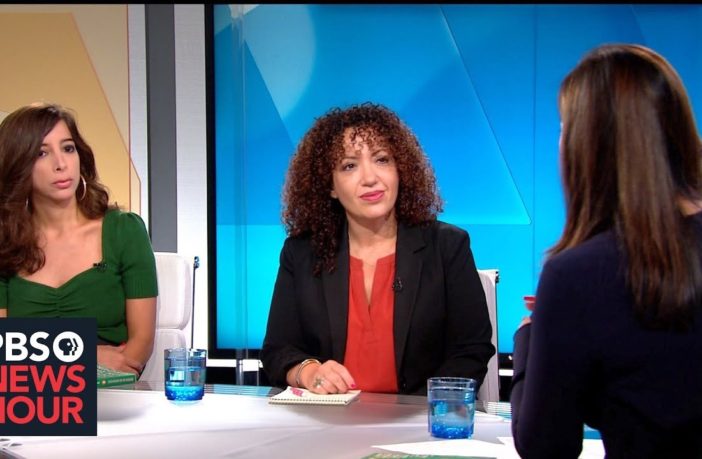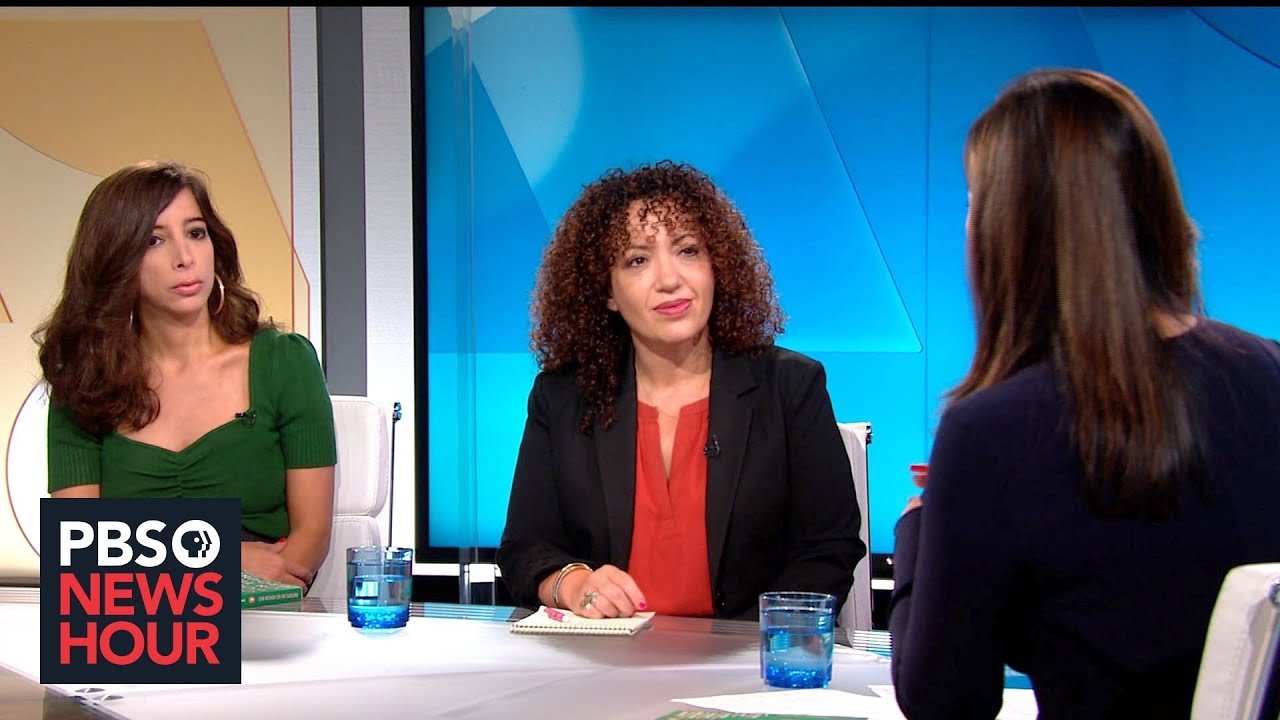PBS.Org
A new book called “Our Women on the Ground: Arab Women Reporting from the Arab World” shares the stories of female journalists working in the Middle East. The editor, Zahra Hankir, and NPR correspondent Hannah Allam, who wrote one of the chapters, sat down with Amna Nawaz recently to discuss how Arab women reporting in the Middle East are both unusually limited and uniquely empowered.
Read the Full Transcript
-
John Yang:
On our Bookshelf tonight, a new look at female reporters in the Middle East.
Amna Nawaz spoke to two women changing the conversation by sharing some of those reporters’ unique stories.
-
Amna Nawaz:
For decades, stories about life and war in the Middle East and Arab world have been filtered through the eyes of predominantly male journalists.
Sometimes, those narratives can obscure the powerful work being done by female journalists, many of Middle Eastern descent.
But a new book called “Our Women on the Ground” seeks to change the conversation by spotlighting 20 Arab female journalists, each writing from her own unique perspective.
Here to discuss their new book is Zahra Hankir, the editor, and NPR correspondent Hannah Allam, who wrote one of the chapters.
Welcome to you both.
-
Zahra Hankir:
Thank you.
-
Hannah Allam:
Thank you.
-
Amna Nawaz:
Congratulations on the book. It is out now.
And, Zahra, I want to start with you, because the idea of this book started with a Google doc, right, compiling a list of journalists that you wanted to follow.
Tell me that story.
-
Zahra Hankir:
Yes, I was working as a reporter in Dubai for Bloomberg News, and I was covering the Arab Spring from the economic angle or perspective.
And I was also asked to monitor regional and local media to help Bloomberg follow up on what was going on around the region from people who were on the ground. And I realized at that point that there were so many incredible Arab women who were doing incredible work and really risking their lives at the front lines.
It wasn’t always people who are on the front lines. It might have been women who were writing different sorts of stories. And I felt at the time that they were not really heard of. A lot of them were not really heard of, at least in the international media landscape. And I felt that their voices needed to be amplified.
But it was also a little bit selfish. I felt that I wanted to learn the stories behind that coverage.
-
Amna Nawaz:
Well, you have got a lot of voices in there. Hannah is one of them, of course.
And, you know, we talk about Western voices and voices from the region. You have, like many people, sort of dual identities, right, multiple identities.
Tell me about how where you grew up and how you grew up made you want to cover the Iraq War, which is the essay that you write about in here?
-
Hannah Allam:
Sure.
I’m an Egyptian American, and grew up in — partly in Oklahoma, but also in the Middle East, in Saudi Arabia and Abu Dhabi. And so this was a region that’s dear to my heart. The people, the culture, the food, the language, everything was, you know, just part and parcel of my childhood and my upbringing.
And I think that — that it’s useful as a barrier breaker. I mean, there are so many trust issues when you’re reporting on people in conflict, when they’re seeing their lives change around them, they’re seeing death.
And then here comes a stranger knocking on the door saying, tell me all about it. If that stranger looks like you, if they know the cultural cues, if you are sensitive with their story, and you consider them — you think about, what if this was your relative that was being interviewed, and, you know, to handle it sensitively like that.
-
Amna Nawaz:
And, Zahra, you mentioned this too.
With all the women who are included in this book, many of them are covering their own homelands, right? And they’re often working in patriarchal societies, right, where men control the public spaces.
How did that inform — like, what kind of common threads did you find in the essays they were contributing along those ideas?
-
Zahra Hankir:
Many of the women, particularly in Egypt and in Yemen, also in Sudan, have to contend with deeply patriarchal societies in which their movement is limited, what they wear on a daily basis is constrained, the way that their families respond to their career ambitions, it’s all part of their struggle on a daily basis.
And all of that filters into how they approach journalism.
There is one particular contributor, Zaina Erhaim. She writes about when the uprising started in Syria, and increasingly the country descended into utter chaos, she was faced with a situation in which she was told repeatedly to cover her hair. She wasn’t able to move from one place to another unless she had a male chaperone.
That’s also a common theme in several of the essays. And she felt that one way to navigate this was to actually embrace the fact that she could enter spaces which were inaccessible to anyone who wasn’t a local and who wasn’t a woman.
-
Amna Nawaz:
In other words, she could have unique access that other people wouldn’t.
-
Zahra Hankir:
So she was going into a Syrian gynecological clinic and she was taking the cameras in there with her.
-
Amna Nawaz:
Yes.
-
Zahra Hankir:
You couldn’t conceive of that story being told by someone else.
-
Amna Nawaz:
And, Hannah, you touch on this too in your essay about the woman question, right?
The idea being that, when you are covering war zones or conflict zones or places where there is conflict of some kind, when you start touching on things that are under the label of women’s issues, they’re seen as illegitimate in some way or not worthy of our attention.
Tell me about that.
-
Hannah Allam:
That’s right.
I think that, you know, if you’re not doing the battle of the day, and you know, you’re not on the front lines, or you’re not covering what’s sometimes called the bang-bang of war correspondents, of war journalism, then, you know, you’re — somehow, you’re soft. It’s not, you know, the meat of the war.
And I think that’s completely inaccurate. And in order to fully and thoroughly and accurately cover a conflict like Iraq, for example, you cannot leave out half the population, and in fact more than half in the case of Iraq.
And even if — it’s just all these assumptions that come into that question: What’s it like to be a woman there? I mean, the assumption is, you can’t do anything, it’s very restrictive, it’s very oppressive. And there is some truth to that, depending on where you are in the region.
But it’s also true that power looks different. There is a quiet power. Sometimes, there is a behind-the-scenes power. Sometimes — you can’t be 60 percent of the population in Iraq and not have some kind of power in your family, in your household that might be exercised in different ways or look different — differently.
And so, my essay, I really saw it as a love letter, almost like a valentine to the Iraqi women who gave me a glimpse of their lives, who allowed me to come to their country and to see so much of it, and who, frankly, on many — many more than one occasion kept me alive.
-
Amna Nawaz:
The Iraq War is certainly one of the biggest stories, one of the biggest conflicts of our times.
Zahra, the women in this book cover a lot of these stories, right, the Syrian refugee crisis, conflict in other countries. You said you wanted to amplify them by including them in this book.
What is it that you think is unique about the way that they tell their stories and the stories that they choose to tell?
-
Zahra Hankir:
I tend to say, actually, they’re just women covering what’s happening in their — in their countries.
You know, the stakes are that high, where I feel that whatever they say is going to be intimate, it’s going to be on a different level when they’re reflecting on that coverage. And it’s those little raw details.
For example, we go on a trip with a Sudanese journalist who, because she’s thought of as non-threatening because she’s a woman, they allow her to go and interview the head of a militia, the Janjaweed at the time, Musa Hilal. And she goes and she interviews him, and she writes this bombshell story. And no one expected that from her.
-
Amna Nawaz:
We have more women, more women from the region, more women with ties to the region covering some of these big stories of our time.
Do you think that plays a role in changing the narrative?
-
Zahra Hankir:
I definitely do, because I do think that the global media narrative on the Arab world has been commanded by Westerners.
I do think that there is a special place for women like Hannah, who have had one foot in the West and one foot in the Arab world or the Middle East and North Africa, who have that special insight and who are well-positioned to do that.
And there have been improvements. I do think that more and more women in this space are being heard. But I think more needs to be done, and I think that the locals need and deserve more protections and should be treated on the same level as their Western counterparts.
-
Amna Nawaz:
Their stories are being heard in your book. It’s “Our Women on the Ground.”
Zahra Hankir and Hannah Allam, thank you very much.
-
Zahra Hankir:
Thank you.
-
Hannah Allam:
Thank you so much.








